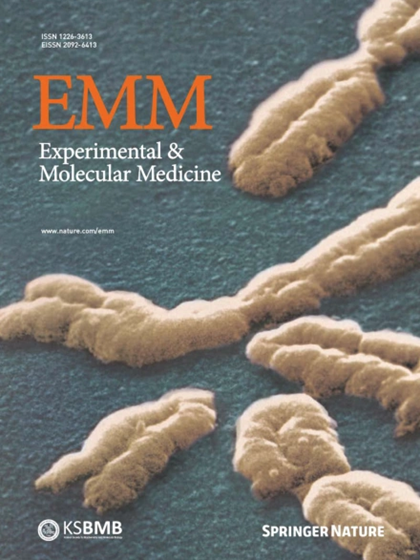SPOCK2通过MMP2调控未成熟胰腺β-细胞的增殖和功能。
IF 9.5
2区 医学
Q1 BIOCHEMISTRY & MOLECULAR BIOLOGY
引用次数: 0
摘要
人多能干细胞衍生的β细胞(SC-β细胞)是糖尿病患者移植的另一种细胞来源。虽然理论上有丝分裂原可以用来扩增β细胞,但成年β细胞很少复制。相比之下,新形成的β-细胞,包括SC-β-细胞,表现出更高的增殖能力和不同的转录和功能谱。通过双向表达调节和单细胞RNA-seq,我们发现SPOCK2是一种ECM蛋白,可以抑制未成熟β细胞的增殖。缺乏SPOCK2的人β-细胞MMP2表达和活性升高,导致β-integrin-FAK-c-JUN通路激活。用MMP2蛋白治疗导致SC-β细胞显著的短期和长期扩增,在体外和体内显著增加葡萄糖刺激的胰岛素分泌。这些发现表明SPOCK2介导了胎儿β细胞的增殖和成熟。总之,我们确定了一种特异性调节SC-β细胞增殖和功能的分子机制,强调了SC-β细胞独特的信号环境,有望为移植提供功能齐全的细胞。本文章由计算机程序翻译,如有差异,请以英文原文为准。

SPOCK2 controls the proliferation and function of immature pancreatic β-cells through MMP2
Human pluripotent stem cell-derived β-cells (SC-β-cells) represent an alternative cell source for transplantation in diabetic patients. Although mitogens could in theory be used to expand β-cells, adult β-cells very rarely replicate. In contrast, newly formed β-cells, including SC-β-cells, display higher proliferative capacity and distinct transcriptional and functional profiles. Through bidirectional expression modulation and single-cell RNA-seq, we identified SPOCK2, an ECM protein, as an inhibitor of immature β-cell proliferation. Human β-cells lacking SPOCK2 presented elevated MMP2 expression and activity, leading to β-integrin-FAK-c-JUN pathway activation. Treatment with the MMP2 protein resulted in pronounced short- and long-term SC-β-cell expansion, significantly increasing glucose-stimulated insulin secretion in vitro and in vivo. These findings suggest that SPOCK2 mediates fetal β-cell proliferation and maturation. In summary, we identified a molecular mechanism that specifically regulates SC-β-cell proliferation and function, highlighting a unique signaling milieu of SC-β-cells with promise for the robust derivation of fully functional cells for transplantation. The human body has a limited ability to regenerate insulin-producing cells, which are crucial for managing diabetes. Researchers are exploring ways to create these cells from stem cells in the lab. This study focuses on understanding how to make these lab-grown cells more effective and plentiful. The researchers used a type of cell called SC-β-cells, derived from human stem cells to study how they grow and function. They discovered that a protein called SPOCK2 plays a role in controlling the growth of these cells. By reducing SPOCK2 levels, they found that the cells grew better and produced insulin more effectively. The study suggests that manipulating SPOCK2 and using proteins like MMP2 can help expand the number of functional insulin-producing cells. This summary was initially drafted using artificial intelligence, then revised and fact-checked by the author.
求助全文
通过发布文献求助,成功后即可免费获取论文全文。
去求助
来源期刊

Experimental and Molecular Medicine
医学-生化与分子生物学
CiteScore
19.50
自引率
0.80%
发文量
166
审稿时长
3 months
期刊介绍:
Experimental & Molecular Medicine (EMM) stands as Korea's pioneering biochemistry journal, established in 1964 and rejuvenated in 1996 as an Open Access, fully peer-reviewed international journal. Dedicated to advancing translational research and showcasing recent breakthroughs in the biomedical realm, EMM invites submissions encompassing genetic, molecular, and cellular studies of human physiology and diseases. Emphasizing the correlation between experimental and translational research and enhanced clinical benefits, the journal actively encourages contributions employing specific molecular tools. Welcoming studies that bridge basic discoveries with clinical relevance, alongside articles demonstrating clear in vivo significance and novelty, Experimental & Molecular Medicine proudly serves as an open-access, online-only repository of cutting-edge medical research.
 求助内容:
求助内容: 应助结果提醒方式:
应助结果提醒方式:


